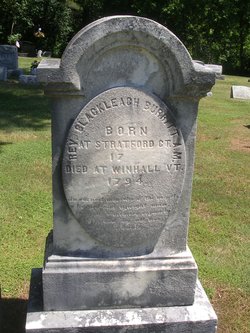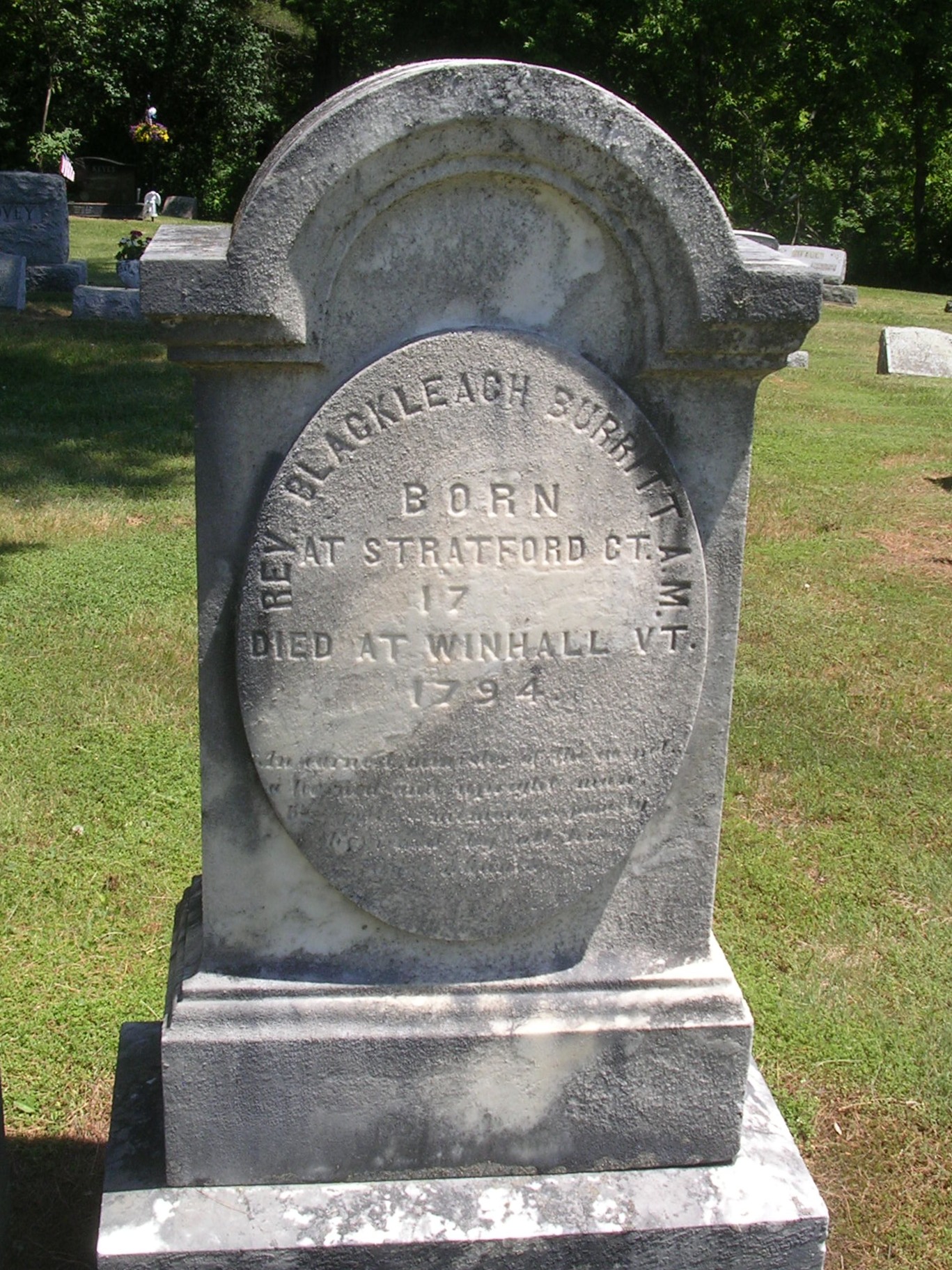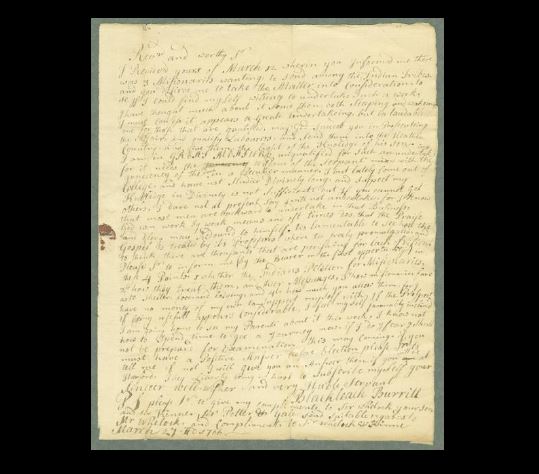He was the son and second child of Peleg Burritt, Jr. and the grandson of Peleg Burritt, Sr. and Sarah Bennett and member of the fifth generation of the Burritt family in America. The Burritts were descended from an old and esteemed Connecticut family and his original immigrant ancestor was William Burritt and his wife Elizabeth who had emigrated to Connecticut around 1640 possibly from Glamorganshire, Wales. They were among the first settlers of Stratford, Connecticut.
His mother was Elizabeth Blackleach, the daughter of Richard Blackleach, Jr. and Mehitabel (Leete) Laborie and a great-granddaughter of William Leete who was the Governor of the Colony of New Haven from 1661 to 1665 and Governor of Connecticut from 1676 to 1683.
His mother died circa 1745 and his father remarried at Ripton Parish on November 25, 1746, Deborah Beardslee, the daughter of Caleb Beardslee and Elizabeth Booth, who was born on February 1, 1726 at Stratford, Connecticut and died at Hanover Green, Pennsylvania on August 7, 1802. They were the parents of five children.
In 1751, he was made the heir of his grandfather Blackleach's large estate, since his mother had already died. He had aspired to further his education and his college tuition was paid for by the inheritance from his grandfather Blackleach's estate.
His great-uncle was the Rev. Dr. Israel Chauncey, the youngest son of President Charles Chauncey. On November 11, 1701, he was chosen Rector, or President of the newly founded Yale College in New Haven, Connecticut.
Soon after graduating from Yale College in 1765, he married, as his first wife, Martha Welles (1744 - April 1786) with whom he had twelve children.
Following the death of his first wife, he married her sister, Deborah Welles in 1788. There were two children born from this second marriage.
He graduated from Yale College in 1765. After graduating, he studied theology with his pastor, the Rev. Jedidiah Mills, Yale College, 1722, and was licensed to preach in the Congregational Church on February 24, 1768, by the Fairfield East Association of Ministers. Shortly after this he was preaching in Ridgebury Parish, in Ridgefield, Connecticut.
Sometime prior to 1774, he and his family had relocated to Dutchess County, New York. He was ordained and licensed to preach that year in the Presbyterian Church and was installed as the pastor of the Pound Ridge Presbyterian Church where he was a very active partisan on the side of the Patriots while serving at this parish.
Burritt was influenced by and championed the causes of the evangelical style of the Great Awakening. He was also greatly influenced by the works of Jonathan Edwards and George Whitefield. He heard Whitefield preach, on several occasions, at the Yale College Chapel. He was also known for his use of extemporaneous preaching.
At the beginning of 1779, he was installed as the pastor of the Congregational Church in Greenwich, Connecticut, and while thus employed, having been prominent in his advocacy of the American cause, he was captured, on the early morning of June 18, 1779, and taken to the Sugar House Prison in New York City, where he was detained for about fourteen months, during which time his family took refuge in Pound Ridge, New York. The British press referred to Blackleach Burritt as that "most pestiferous rebel priest and preacher of sedition".
While Rev. Burritt was so incarcerated, being sick almost unto death, he was kindly ministered unto by William Irving, father of Washington Irving, and to whom he afterwards gave a quaint certificate vouching for his loyalty and setting forth the facts of the case, he (Irving) evidently being under the impression that his residence in the city during the war might expose him to proscription on the part of the now victorious Patriots. The document is published in Vol. I., of Washington Irving's Biography, and reference is made to the fact in the Burritt Family Record.
The exact date of his release from the Sugar House Prison is not known. However, by October 1780, he was living near Crompond, New York where he was serving as pastor of the Presbyterian Church at that location.
He served as the pastor of several Presbyterian churches in Westchester County, New York from 1780 to around 1788. In 1788 or 9 he was preaching in the North Parish of New Fairfield, Connecticut, now the town of Sherman, Connecticut; and in 1790 he was similarly engaged in Greenfield, then part of Saratoga, New York. Sometime in 1790, he had relocated to Duanesburg, New York where many members of his family had settled and he founded the Presbyterian Church in Duanesburg around this same time.
In 1792, he began to preach to the Congregational Society in the village of Winhall, Vermont where he was installed pastor on January 1, 1793. He died in Winhall, Bennington County, Vermont of a prevailing fever on August 27, 1794, aged about 50 years.
Mr. Burritt is reported to have had wonderful physical strength and agility. As a preacher he was noted for fluency and a love of argument.
He was the son and second child of Peleg Burritt, Jr. and the grandson of Peleg Burritt, Sr. and Sarah Bennett and member of the fifth generation of the Burritt family in America. The Burritts were descended from an old and esteemed Connecticut family and his original immigrant ancestor was William Burritt and his wife Elizabeth who had emigrated to Connecticut around 1640 possibly from Glamorganshire, Wales. They were among the first settlers of Stratford, Connecticut.
His mother was Elizabeth Blackleach, the daughter of Richard Blackleach, Jr. and Mehitabel (Leete) Laborie and a great-granddaughter of William Leete who was the Governor of the Colony of New Haven from 1661 to 1665 and Governor of Connecticut from 1676 to 1683.
His mother died circa 1745 and his father remarried at Ripton Parish on November 25, 1746, Deborah Beardslee, the daughter of Caleb Beardslee and Elizabeth Booth, who was born on February 1, 1726 at Stratford, Connecticut and died at Hanover Green, Pennsylvania on August 7, 1802. They were the parents of five children.
In 1751, he was made the heir of his grandfather Blackleach's large estate, since his mother had already died. He had aspired to further his education and his college tuition was paid for by the inheritance from his grandfather Blackleach's estate.
His great-uncle was the Rev. Dr. Israel Chauncey, the youngest son of President Charles Chauncey. On November 11, 1701, he was chosen Rector, or President of the newly founded Yale College in New Haven, Connecticut.
Soon after graduating from Yale College in 1765, he married, as his first wife, Martha Welles (1744 - April 1786) with whom he had twelve children.
Following the death of his first wife, he married her sister, Deborah Welles in 1788. There were two children born from this second marriage.
He graduated from Yale College in 1765. After graduating, he studied theology with his pastor, the Rev. Jedidiah Mills, Yale College, 1722, and was licensed to preach in the Congregational Church on February 24, 1768, by the Fairfield East Association of Ministers. Shortly after this he was preaching in Ridgebury Parish, in Ridgefield, Connecticut.
Sometime prior to 1774, he and his family had relocated to Dutchess County, New York. He was ordained and licensed to preach that year in the Presbyterian Church and was installed as the pastor of the Pound Ridge Presbyterian Church where he was a very active partisan on the side of the Patriots while serving at this parish.
Burritt was influenced by and championed the causes of the evangelical style of the Great Awakening. He was also greatly influenced by the works of Jonathan Edwards and George Whitefield. He heard Whitefield preach, on several occasions, at the Yale College Chapel. He was also known for his use of extemporaneous preaching.
At the beginning of 1779, he was installed as the pastor of the Congregational Church in Greenwich, Connecticut, and while thus employed, having been prominent in his advocacy of the American cause, he was captured, on the early morning of June 18, 1779, and taken to the Sugar House Prison in New York City, where he was detained for about fourteen months, during which time his family took refuge in Pound Ridge, New York. The British press referred to Blackleach Burritt as that "most pestiferous rebel priest and preacher of sedition".
While Rev. Burritt was so incarcerated, being sick almost unto death, he was kindly ministered unto by William Irving, father of Washington Irving, and to whom he afterwards gave a quaint certificate vouching for his loyalty and setting forth the facts of the case, he (Irving) evidently being under the impression that his residence in the city during the war might expose him to proscription on the part of the now victorious Patriots. The document is published in Vol. I., of Washington Irving's Biography, and reference is made to the fact in the Burritt Family Record.
The exact date of his release from the Sugar House Prison is not known. However, by October 1780, he was living near Crompond, New York where he was serving as pastor of the Presbyterian Church at that location.
He served as the pastor of several Presbyterian churches in Westchester County, New York from 1780 to around 1788. In 1788 or 9 he was preaching in the North Parish of New Fairfield, Connecticut, now the town of Sherman, Connecticut; and in 1790 he was similarly engaged in Greenfield, then part of Saratoga, New York. Sometime in 1790, he had relocated to Duanesburg, New York where many members of his family had settled and he founded the Presbyterian Church in Duanesburg around this same time.
In 1792, he began to preach to the Congregational Society in the village of Winhall, Vermont where he was installed pastor on January 1, 1793. He died in Winhall, Bennington County, Vermont of a prevailing fever on August 27, 1794, aged about 50 years.
Mr. Burritt is reported to have had wonderful physical strength and agility. As a preacher he was noted for fluency and a love of argument.
Inscription
His grave at Winhall is unmarked. A memorial stone was placed at Factory Point Cemetery in Manchester. The following is the inscription upon it:
Rev. Blackleach Burritt
Born at Stratford, Ct., 17-
Died at Winhall, Vt., 1794
"An earnest Minister of the Gospel, a learned and upright man, His spotless memory is piously cherished by his descendants."
Family Members
-
Eunice Burritt Hopkins
1766–1799
-
![]()
Melissa Burritt Raymond
1768–1849
-
![]()
Martha "Patsy" Burritt Gray
1770–1851
-
![]()
Sarah Burritt Wells
1772–1831
-
Dr Eli Burritt
1773–1823
-
![]()
Deacon Gideon Burritt
1774–1858
-
![]()
Diantha Burritt Gray
1776–1846
-
Blackleach Burritt Jr
1779–1830
-
Prudence Burritt Welles
1782–1852
-
![]()
Susannah "Susan" Burritt Adams
1786–1881
-
Deborah Burritt Hatch
1790–1854
-
![]()
Selah Welles Burritt
1793–1810














